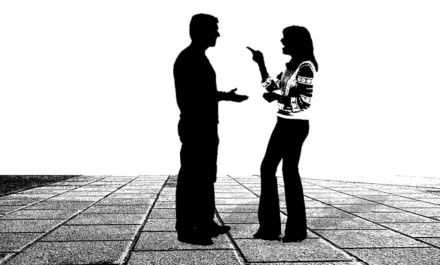Growing up, I was indoctrinated early to know that obedience and submission were godly, while rebellion or disobedience would end in eternal damnation. I probably could’ve told you this in simple terms by the time I was three or four years old.
I grew up playing church with my sister, and a huge part of that was beating our baby dolls into submission during our services. Those poor dolls were so naughty they got a “spanking” about every two minutes. Although, like most children, we probably over dramatized things a touch in our play, we were truly mirroring what we were being taught in our lives, through observation and personal experience.
Recently, I asked my therapist about why, in my childhood, I walked around in a fog all the time. I had no mental clarity about the passing of time, the structure of school, the location of anything outside of my home and my street, and many more things. I spent hours every day daydreaming and spinning wonderful stories in my mind, in which I was the recipient of many wonderfully ideal happenings. I read voraciously, and when I wasn’t reading, I was imagining stories in my own mind. My therapist noted that I grew up where I had very little control over my own life, and made virtually no decisions for myself. In addition, my life was boring; no extra-curricular activities of any kind, no television, no outside influences of any kind. In this sheltered environment, my mind created its own entertainment and ended up developing a very active imagination. Although there was nothing psychotic about this, it did make it difficult for me later in life, when reality imposed upon my dream world, causing extreme disappointment.
As a teen and young adult, I was at a place to fully understand that submission to my father, my mother, my pastor, and my future husband would be my lot in life. At that point, I didn’t fully grasp what it could mean to me. I did chafe at some of the rules in my own mind, but then I would quickly repent of my “questioning” and ask God to help me to submit without an attitude or doubt, because I was taught that it was only true submission if you didn’t’ question or doubt, but you submitted your will completely. Although that phrase I just typed now gives me chills at how unhealthy it was, it was all I knew at the time, and being highly contentious, I wanted to please God.
Off to Bible School right out of home school graduation, I was like an innocent child turned loose in a public park — although we were still somewhat sheltered in the Bible school environment. My unquestioning submission took me right to the top of the class from the very first. One professor commented that this was because I knew how to obey and I took him at his word when he told the class what he expected. He used my work as an example to the others. It was embarrassing, but it caused me to try even harder to please, because I felt I had reached the desired mark of submission in that moment and situation.
Another thing that happened at Bible school was that I was no longer under my father’s watchful eye, and boys were showing their interest for the first time in my life. Some of the young men at Bible School were very nice young men and went on to become preachers, pastors and missionaries. Others, however, were not respectful of women. My naivete was very marked, even in such a sheltered environment. I attracted the attention of a boy who I now feel was probably very experienced sexually and definitely had none of the naivete that I possessed. It is odd how one type of abuse conditions a person to attract other types of abuse. It is as if there was an invisible sign on me saying “I am open to abuse.” Even back then, I mostly attracted a dominant type. There was a lot of pressure from this boy to have sex with him, even though we were at Bible school. Finally, on one occasion I was terrified he was about to rape me. After that situation, I refused to go out with him again. I was tired of fighting him off and begging him to stop short of his goal. Strangely, out of all the teaching we were receiving in Bible school, the one thing he picked up that he liked to use on me was “We don’t have rights. We only have responsibilities.” Another thing that strikes me is that I still remember that statement all these years later, though we dated only very briefly.
Back home with my family and at my home church, I threw myself into service within the local church. I played music, sang, led groups, and used my car to carry people to church. I refused to take a job that would make me miss any church, and I worked hard to submit to everything my pastor/dad preached. I wanted to move out and get my own home, since I had a full time job, but it was frowned upon, so I never even voiced the desire. Instead, like a good Pentecostal girl, I dutifully went to every youth convention and worked hard to dress attractive and “holy” at the same time (a difficult feat sometimes). I was attracted to different young men, but I didn’t have very good social skills and was painfully shy, so I did not get noticed.
Finally, I met my soon to be husband. His family was even more strict than my own. They were in the same religion, but had a lot more rules. His social skills were even worse than mine, so we shyly began to communicate, then awkwardly date (always with a chaperone and never touching even so much as to hold hands–that was forbidden). Early in our formal dating, I told him that, as his girlfriend, I didn’t want to “bring shame on” his ministry, so I asked him to let me know if I was not following one of the “standards of holiness” that he preached, so that I could adjust my life to fit his. Part of the reason I did this was because I wanted to know his beliefs in full while we were dating, but I had also been taught that I should submit to the strictest of standards in such situations. A month or so later, after our engagement, his parents visited, and while they were there, he reminded me of my statement and told me my necklines were “too low.”
I put on the dresses he had criticized (or his family had criticized to him–it all amounted to the same thing) and got in front of a mirror in all kinds of contortions to see why he thought they were too low. Seeing nothing immodest, I went to my parents and did the same in front of them to see if they could see anything. They couldn’t either. I was bothered. I felt shamed and degraded. It didn’t make any logical sense. But, I wanted to be submissive to my husband in my upcoming marriage, so I prayed about it and raised the necklines.
After we were married, submission became even more of an excuse to abuse power. I soon received the message, delivered personally and in my face, that the Bible said that a wife could not deny her husband sex because it was a sin to do so. My parents had never taught me that–but they had laid a foundation of submission that created fertile soil for this teaching. It was my job to work hard to please my husband by running the home, keeping it clean, and providing good meals for him while keeping his sexual appetite filled. At the time, I was working a full time secular job and he was working part time at the church for “peanuts” as a salary. We were mostly living off of my income, and driving my car which was paid for. He was deeply in debt and not working outside of church. I would come home to filth and he’d been home all day. I was expected to clean everything up, do all the laundry, cook us supper, and still feel excited about having sex with him every night….because that was what submission was.
This set the tone for the rest of our marriage. If he said to spank one of our children for something that was developmentally appropriate, I had to do it in order to be submissive. If I didn’t obey in everything, I had a “spirit of rebellion” and I was a “nagging, unsubmissive wife.” If he told me not to yell out in fear while he was driving and I instinctively did it some time later, I was “not being obedient.”
He had told me, and it was my responsibility to obey.
When I had endometriosis that made it very painful to have intimate relations, he became angry that I didn’t want to go through that pain. I had a “spirit of rebellion” and was not willingly giving him his “just due.” So, I learned to grit my teeth through the pain and made a doctor’s appointment to get checked out as soon as possible. Soon I was feeling better, and things went back to the way they were. When he was ready to have a second child, it was really not for me to disagree. I wasn’t ready yet, but he was the “boss” so I felt I had to give in.
This was my life….. and so much more… for many years. I stayed pregnant and had a house full of kids–all of whom I love very much.
Yet things got even worse. Part of his abuse to me was emotional/verbal abuse. He would tell me I was “stupid” and “you don’t know anything.” There were a myriad of other negative messages. Many of them were outright lies. He blamed me for moving things he misplaced, for somehow causing him to overdraw the checking account, for having my fingers in the wrong place when he slammed a door on my hand, and on…and on…and on. Many times, immediately following an episode of extreme disrespect or hatefulness, without any kind of apology, he wanted to have sex. I hated those moments. I wanted it to be about love, mutual respect, kindness, and tenderness. Instead, it felt like prostitution. I felt like his property. He could yell at me, call me names, humiliate and put me down, and then have sex with me all in the same breath, and I had no say in any of it.
When I would complain and tell him how I felt, I would be accused of having a problem with discontentment, being “impossible to please,” or again, “the nagging wife,” the “unsubmissive wife” that was a “blight on her husband’s ministry.”
There were many times I laid in bed with silent tears running down my cheeks while he used my body. Sometimes he would waken me in the middle of the night out of a deep sleep and demand sex. Once I pretended to be deeply asleep so he would leave me alone. He sighed, then began to pray loudly for God to intervene in my soul. I felt like his prostitute; not his wife, to be loved and protected. I remember crying silent tears in the night because I wanted to be loved, I wanted to be cherished as a person and appreciated for who I was.
Going back and looking through my private journals during that time is very triggering for me. Between the heart breaking episodes I recorded, there would be “devotionals” about submission; about how to better respect my husband; about being a better wife and praying for him appropriately. The prayers I wrote down to God, asking him to help me to submit my will and not long for things that I didn’t have are right beside the art I drew to show how my heart had been shredded by the abusive treatment. I so wanted to be saved! Yet, I believed that anything less than total submission to the will of my husband would be displeasing to God, and ultimately cause me to be lost.
As I sat earlier this week in my counseling session and finally shared these events with the counselor I’ve been seeing for years, his response startled me. I had told him there was no sexual trauma in my past. My childhood was highly controlled and strict, but I’d not had any sexual abuse. He pointed out to me that, although it is great that my childhood didn’t contain sexual abuse, there is a history of sexual trauma in my life as an adult.
I responded that I’ve always told counselors “no” when they’ve asked if I was ever raped by my ex-husband. told him “I wasn’t really raped, because I’d been taught I had to consent no matter what. It was said that rape in a marriage was not possible. Maybe I am minimizing what happened to me, but I’m not sure it was rape. I didn’t say ‘no.’ I submitted because I thought I had to do so to be saved.”
The therapist really emphasized to me that, no matter if you call it “rape” or “coercion,” or “dominance,” it all has the same effect in the end…it is sexual trauma. “Dominance was enacted upon you against your will, and that is traumatic.”
It was deeply thought provoking for me. The submission teaching was extremely dangerous and damaging. No human being should EVER have to submit their will entirely to another human being–but that is what submission was to me at the time.
A few days ago I read a chapter in Dr. Bruce Perry’s book, The Boy Who was Raised as a Dog. He shares how his team was called to work with the children who were released from the Branch Davidian group in Waco. These children had been raised in a terribly damaging cult. Although that cult was much more controlling than my early life, there were some key elements that I could identify with. The author commented that these children had been “marinated in fear,” and he goes on to explain how continued fear tactics cause our brains to create too much cortisol (Perry, 2017). He describes how these children had great talent at artwork and other skills, such as reading. Many of them were extremely familiar with Bible passages, but had no idea how to make basic decisions, like what they wanted for dinner. They had not been allowed to figure out what they liked or didn’t like or even who they were individually (Perry, 2017).
In this way, I could identify with these children. In many aspects of life, we never had the option to decide things for ourselves. It was unheard of to even entertain the thought or possibility of being different from who we had been told we were. Our purpose was laid out before us by others, and we were told what to think, who to befriend, what to love, what to hate, how to dress, how to comb our hair, who to talk to, and who to avoid. Like the children Perry described, we viewed all outsiders as “unbelievers,” and therefore, anything they said was automatically suspect (Perry, 2017). Like those children were able to draw detailed drawings to represent their indoctrination and their collectivist society, yet unable to draw a self portrait; my life was also consumed with submission to norms of the group. I could recite chapters from the Bible and explain complex doctrines, yet had no idea who I was as an individual.
This is the trauma of submission.
It is not biblical. In fact, a careful study of submission in the Bible will show that a mutual submission was taught. It never meant literally checking your brain at the door, like I was taught to do. Instead, it was submission in the sense of accepting others as they are and not trying to conform them to your will. It begs the question, how can so many concepts become so twisted in such environments, so that they end up teaching the exact opposite of their originally intended message?
********
Shop at our Amazon store! As an Amazon Influencer, this website earns from qualifying purchases.





